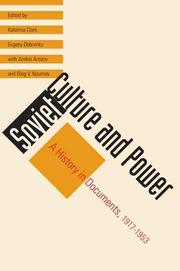| Listing 11 - 17 of 17 | << page >> |
Sort by
|
Book
ISBN: 9781107068513 Year: 2015 Publisher: Cambridge : Cambridge university press,
Abstract | Keywords | Export | Availability | Bookmark
 Loading...
Loading...Choose an application
- Reference Manager
- EndNote
- RefWorks (Direct export to RefWorks)
Russian literature --- Russian literature --- History and criticism. --- History and criticism.
Book
ISBN: 9781783086986 9781783086979 Year: 2018 Publisher: London Anthem Press
Abstract | Keywords | Export | Availability | Bookmark
 Loading...
Loading...Choose an application
- Reference Manager
- EndNote
- RefWorks (Direct export to RefWorks)
Book
ISBN: 0300252846 Year: 2021 Publisher: New Haven : Yale University Press,
Abstract | Keywords | Export | Availability | Bookmark
 Loading...
Loading...Choose an application
- Reference Manager
- EndNote
- RefWorks (Direct export to RefWorks)
In this nuanced historical analysis of late Stalinism organized chronologically around the main events of the period - beginning with Victory in May 1945 and concluding with the death of Stalin in March 1953 - Evgeny Dobrenko analyzes key cultural texts to trace the emergence of an imperial Soviet consciousness that, he argues, still defines the political and cultural profile of modern Russia.
Arts, Soviet. --- Politics and culture --- Russian literature --- Socialist realism in art --- Socialist realism in literature. --- Socialist realism in music. --- Soviet literature --- History. --- History and criticism. --- History and criticism. --- Stalin, Joseph, --- Soviet Union --- Soviet Union --- Soviet Union --- Politics and government --- History --- Social conditions.
Multi
ISBN: 9781783086986 9781783086979 Year: 2018 Publisher: London Anthem Press
Abstract | Keywords | Export | Availability | Bookmark
 Loading...
Loading...Choose an application
- Reference Manager
- EndNote
- RefWorks (Direct export to RefWorks)
Thematology --- Literature --- Europe
Book
ISBN: 1316426378 1316426769 1316427544 131642832X 1316427153 1316429105 1107705959 1107068517 1107677688 1316423603 Year: 2015 Publisher: Cambridge : Cambridge University Press,
Abstract | Keywords | Export | Availability | Bookmark
 Loading...
Loading...Choose an application
- Reference Manager
- EndNote
- RefWorks (Direct export to RefWorks)
Russian Literature since 1991 is the first comprehensive, single-volume compendium of modern scholarship on post-Soviet Russian literature. The volume encompasses broad, complex and diverse sources of literary material - from ideological and historical novels to experimental prose and poetry, from nonfiction to drama. Written by an international team of leading experts on contemporary Russian literature and culture, it presents a broad panorama of genres in post-Soviet literature such as postmodernism, magical historicism, hyper-naturalism (in drama), and the new lyricism. At the same time, it offers close readings of the most prominent works published in Russia since the end of the Soviet regime and elimination of censorship. The collection highlights the interdisciplinary context of twenty-first-century Russian literature and can be widely used both for research and teaching by specialists in and beyond Russian studies, including those in post-Cold War and post-communist world history, literary theory, comparative literature and cultural studies.
Multi
ISBN: 9781107705951 9781107068513 9781107677685 Year: 2015 Publisher: Cambridge Cambridge University Press
Abstract | Keywords | Export | Availability | Bookmark
 Loading...
Loading...Choose an application
- Reference Manager
- EndNote
- RefWorks (Direct export to RefWorks)

ISBN: 9780300106466 0300106467 Year: 2007 Publisher: New Haven (Conn.) : Yale university press,
Abstract | Keywords | Export | Availability | Bookmark
 Loading...
Loading...Choose an application
- Reference Manager
- EndNote
- RefWorks (Direct export to RefWorks)
Leaders of the Soviet Union, Stalin chief among them, well understood the power of art, and their response was to attempt to control and direct it in every way possible. This book examines Soviet cultural politics from the Revolution to Stalin's death in 1953. Drawing on a wealth of newly released documents from the archives of the former Soviet Union, the book provides remarkable insight on relations between Gorky, Pasternak, Babel, Meyerhold, Shostakovich, Eisenstein, and many other intellectuals, and the Soviet leadership. Stalin's role in directing these relations, and his literary judgments and personal biases, will astonish many. The documents presented in this volume reflect the progression of Party control in the arts. They include decisions of the Politburo, Stalin's correspondence with individual intellectuals, his responses to particular plays, novels, and movie scripts, petitions to leaders from intellectuals, and secret police reports on intellectuals under surveillance. Introductions, explanatory materials, and a biographical index accompany the documents.
Communism and culture --- Communism and culture --- Communism and intellectuals --- Communism and intellectuals --- Politics and culture --- Politics and culture --- Politics and literature --- Politics and literature --- Power (Social sciences) --- Power (Social sciences) --- History --- History --- History --- History --- History --- Soviet Union --- Cultural policy
| Listing 11 - 17 of 17 | << page >> |
Sort by
|

 Search
Search Feedback
Feedback About UniCat
About UniCat  Help
Help News
News